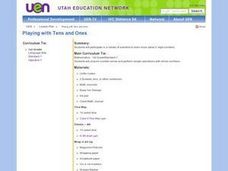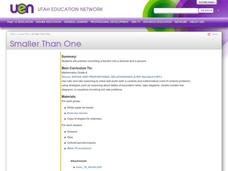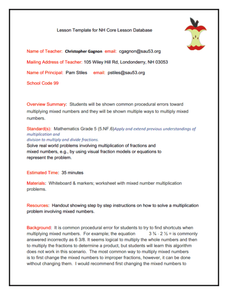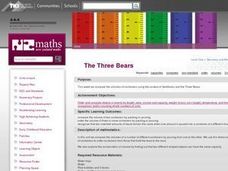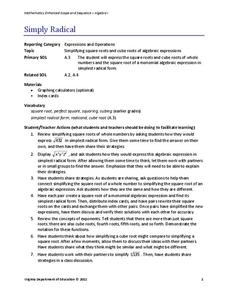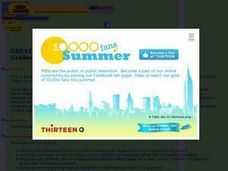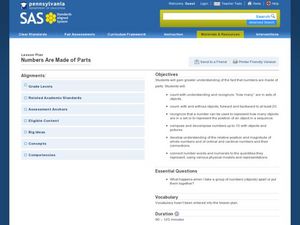Curated OER
Worksheet Chapter 1, 1.2-1.8 College Prep Algebra
In this algebra worksheet, students complete a variety of basic algebra problems. They compare integers, identify sets of numbers, simplify equations, translate words into numerical expressions, and identify properties. This worksheet...
Curated OER
Playing with Tens and Ones
First graders complete a number of activities that increase their number sense and use of simple operations. They use dice and worksheets to make two-digit numbers and to record them, they count by tens and ones, and order numbers using...
Curated OER
Smiling at Two Digit Multiplication!
How do I solve a two-digit multiplication problem? Your class tackles this question by walking through problem solving methods. They first investigates and applies traditional multiplication methods, and they then compare those with...
Curated OER
Earth Day Number Sense
Elementary schoolers count and order objects using numbers 1-300. They bring recyclable items from home. Students group the items, skip count by 2's, 3's, and 5's, and arrange the items on a number line. Recyclable plastic bags are put...
Roy Rosenzweig Center for History and New Media
European Explorers
To compare how the Spanish, French, and English approached the exploration of North America, class groups examine primary source documents and become experts on one of four explorers: Francisco Coronado, Robert LaSalle, Samuel de...
Curated OER
1920s Variety Show
To better understand the cultural achievements of the Harlem Renaissance and become familiar with its major figures, class members examine a painting by Aaron Douglas and a poem by Langston Hughes and compare how the artists develop...
Illustrative Mathematics
What is a Trapezoid? (Part 1)
Challenge your class to construct a definition for trapezoids. Looking at four examples and four non-examples, students individually create definitions and use them to classify an unknown shape. Allow for small group and whole-class...
Baylor College
There's Something in the Air
Clever! In order to compare indoor and outdoor dispersal rates for the movement of gases and particles through air, collaborators will participate in a classroom experiment. Set up a circular grid and set students on lines that are...
Institute of Electrical and Electronics Engineers
Exploring at the Nanoscale
Nano-nano! Nanotechnology can seem like it's from another planet! After learning about this tiny technology, collaborative groups experiment with how smaller particles affect chemical reactions. They do this by immersing a whole and a...
Curated OER
Smaller Than One
Sixth graders practice converting a fraction into a decimal and a percent. They explain relationships among rational numbers. They order and compare whole numbers, fractions (including mixed numbers), and decimals using a variety of...
Curated OER
Moooving to Low-fat Milk
Third graders complete two handouts. In this healthy beverages instructional activity, 3rd graders compare whole, two percent and skim milks. Students use labels to help choose healthy beverages. Students complete an "All About Milk" and...
Curated OER
Multiplying Mixed Numbers
For this multiplying mixed numbers worksheet, students with a partner problem solve and calculate the answers to ten word problems and mathematical equations.
Curated OER
Analysis and Compare and Contrast
Students study images to analyze their content and complete a compare and contrast study of the pictures. In this image analysis activity, students complete two worksheets of images with captions. Students compare and contrast the images...
Curated OER
The Three Bears: Comparing and Ordering
Students explore comparing and ordering volume of containers. They use the context of Goldilocks and the Three Bears to compare the volume of various containers by packing or pouring.
Curated OER
Lesson 2 Ordering Numbers
Math wizards begin the lesson by comparing and ordering rational numbers. Using a number line, they discover the relationship between the numbers and practice ordering them in the correct way. They also review proper techniques for...
Curated OER
Reading, Writing, and Ordering Numbers
Students study place value. Students participate in place value and number relay games, write numbers in words, and discuss how numbers are read. As a class, they discuss the meaning of less than and grater than signs. Students use...
Virginia Department of Education
Simply Radical
Simplifying is radical, dude! After reviewing how to simplify square roots of whole numbers, scholars consider how to simplify square roots of algebraic monomials. Also taken under consideration is how to simplify cube roots of whole...
Curated OER
Fraction City
Learners calculate equivalent fractions, solve the addition of fractions of like and unlike denominators, and compare fractions using fraction strips. They fold paper strips into equal parts, thirds, sixths, ninths, and twelfths, and...
Curated OER
Number Line
Explore how to make a number line and how to mark the numbers along the number line using fraction and decimal notation. Your scholars will compare and order fractions and decimals and find their appropriate position on the number line.
Curated OER
American Political Culture
Examine American political culture with your scholars using this self-assessment lesson. Individuals rate a list of 14 values from highest to lowest, including ideas such as financial security, right to private property, justice,...
Curated OER
Great Shapes Alive!
Compare two- and three-dimensional shapes and construct three dimensional models from two-dimensional shapes. Diagram the shapes and reflect about the process in writing.
Curated OER
Who Has More?
Pupils engage in a lesson that is concerned with the standard of comparing the quantities of whole numbers using different strategies from the concrete to the abstract. They count objects and compare them, use symbols of comparison, and...
Curated OER
Going Whole Hog
Learners participate in a game in which they compare fractions and graph the fractions.
Pennsylvania Department of Education
Numbers Are Made of Parts
Children play with barnyard animal cards to practice composing and decomposing numbers. With their "secret number" of animal cards in a cup, they shake and spill them onto a barn story board, counting how many animals fall in the barn...

